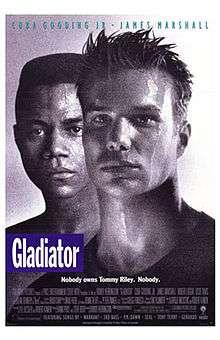Verus (gladiator)
Verus was a well-known gladiator during the reigns of the Emperors Vespasian and Titus in the latter part of the 1st century. His combat with Priscus was the highlight of the opening day of the games conducted by Titus to inaugurate the Flavian Amphitheatre (later the Colosseum) in AD 80, and was recorded in a laudatory poem by Martial — the only detailed description of a gladiatorial fight that has survived to the present day. Both gladiators were declared victors of the combat, and were awarded their freedom by the Emperor in a unique outcome.
Martial, Liber de Spectaculis, XXIX:
Verus in arts and popular culture

Gladiator (Melvin Potter)
Gladiator (Melvin Potter) is a fictional character appearing in American comic books published by Marvel Comics. Potter was initially depicted as a supervillain and one of the first enemies of the superhero Daredevil. In civilian life, he is a costume-designer at the Spotlight Costume Shop in New York City. He eventually reformed and became one of the staunchest supporters of Daredevil. Melvin Potter is portrayed by Matt Gerald in the Marvel Netflix series Daredevil as part of the Marvel Cinematic Universe.
Publication history
Gladiator first appeared in Daredevil #18 (July 1966), and was created by Stan Lee and John Romita Sr.
Fictional character biography
Melvin Potter was a costume designer who decided to become a professional criminal. He designed a suit of battle armor for himself, complete with deadly wrist blades, and became known as the Gladiator. He battled Daredevil in his first criminal outing, and then met the Masked Marauder, another enemy of Daredevil's. Gladiator later appeared in Europe, where he fought Daredevil again, and was then invited to join the Maggia. He joined Electro's Emissaries of Evil to attack Daredevil again. Later, Gladiator aided Whitney Frost in a raid of Stark Enterprises, where he first fought Iron Man.

Gladiator (1992 film)
Gladiator is a 1992 American sports drama film directed by Rowdy Herrington, and starring Cuba Gooding, Jr., James Marshall, Brian Dennehy, and Robert Loggia. The film tells the story of two teenagers trapped in the world of illegal underground boxing. One is fighting to pay off gambling debts accumulated by his father. The second is fighting for the money to get out of the ghetto. While being exploited by a boxing promoter, the two teens become friends.
Plot
Tommy Riley and his father have just moved to start a new life. Tommy's father has accumulated many gambling debts but has found a new job that requires him to travel extensively, leaving his son alone at home. Tommy also has a hard time fitting in at school, having crossed gang members. He takes a job at a local diner and enters into a romantic relationship with Dawn, the daughter of the owner, but is jumped by the gang members outside the restaurant. Seeing how well Tommy is able to fight, a local boxing promoter by the name of Pappy Jack offers Tommy a chance to fight in an illegal underground boxing operation. When two men arrive announcing that Tommy's father owes a large sum of money to pay off gambling debts, Jack convinces his boss, boxing promoter Jimmy Horn to buy out the debt, which forces Tommy to pay off his father's debts by boxing.

Combat (juggling)
Combat juggling is a sport played by two or more players juggling three juggling clubs each. Combat can be played individually against a single opponent (one-on-one-combat), between teams of two or more players each, or in a group where everyone plays against everyone. The object of the game is to maintain the own juggling pattern while attempting to make the opponent drop one or more clubs.
Rules and gameplay
Basic rules
The players start juggling three clubs at the same time. Players are allowed to interfere with other players' patterns in an attempt to make them drop. They should only attack their opponents' clubs, not their opponents' bodies. Anyone who is no longer juggling at least three clubs (because they dropped, collected, or had a club stolen by an opponent) is out of the game. The last person left juggling wins.
One-on-one-combat
The player who drops will not gain a point, while the player who maintains the juggling longer than the opponent and finishes its pattern cleanly, i.e. catches all three clubs without dropping, will.
Verus
Verus may refer to:
See also
Podcasts:

